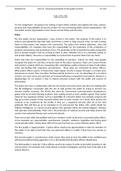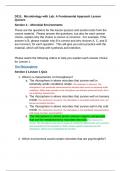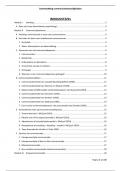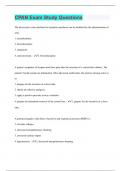Task 1 (P2, M2)
For this assignment I am going to be writing a report which outlines and explains the roles, powers,
purpose and responsibilities of security workers for two contrasting public service organizations. The
two public service organisations I have chosen are the Police and the Army.
Police
My first public service organisation I have chosen is the police. The purpose of the police is to
enforce and uphold the law both fairly and firmly in order to help prevent crime. As well as being
there to help protect and reassure the community. The police have several objectives, roles and
responsibilities. For example; they have the responsibility for the protection of life, protection of
property and premises and prevention of loss. The protection of life is basically the police trying their
best to protect people’s lives by arriving to them in time. Whether this is to a domestic assault or
and armed robbery, they have a responsibility to try their best to protect them from any harm.
Police also have the responsibility for the ‘patrolling of premises.’ Patrols are what most people
recognize the police for and they consume most of the police resources. There are a total of three
main parts to a patrol which are; answering calls, maintaining a police presence in hope it will reduce
crime and dealing with suspicious circumstances. These steps are conducted by police officers.
When police officers patrol, it means they make regular circuits or passes through in a certain area,
also known as a beat. They can either do these patrols by foot or a car. An advantage of a car patrol
is that it can cover more area and have an increased efficiency compared to foot patrols. However, a
disadvantage for car patrols is that it reduces personal contact with the public and sources of
information.
The police also have a collaboration with the UK counter terrorism police and they are working with
the UK intelligence community with the aim to help protect the public by trying to prevent any
terrorist activity occurring. The GCHQ, also short for Government communications headquarters,
gather intel by secretly listening to phone calls, reading emails or from satellite signals. They mainly
check for any suspicious activity, such as a possibility of a terrorist attack. For example; suspects will
flag up on their systems if they searched online how to build a bomb. As a result, their activity will
continue to be monitored by the GCHQ. If they are a suspected terrorist after all of the intel
gathered, MI5 will then go on an operation to try and prevent the attack. Mi5, which stands for
Military Intelligence, is a secret security agency that operates within the United Kingdom, whereas
Mi6 operates internationally. Their role is the protection of national security and helps protect the
country from potential threats such as terrorist attacks.
There are certain skills and qualities which are needed in order to become a successful police officer.
A few examples are; approachable, assertiveness, maturity, resilience, inquisitive and having good
communication skills. Having these skills will ensure that they are a more effective police officer.
The first quality is ‘Approachable.’ A police officer needs to be approachable in order for members of
the public to be able to feel that they can approach officers in public if they have any worries or
concerns.
The second quality is ‘assertiveness’ which means they need to have the ability to be confident and
self-assured without being aggressive; it is a vital quality that all police officers should have.
The third quality is ‘maturity.’ Police officers need to be mature in order to deal with situations in the
correct manor. For example, they could attend a murder investigation and they have to be able to be
mature about it.
, Shannon W Unit 29 : Security procedures in the public services P2, M2
The forth quality is ‘resilience’ which is the ability to recover quickly from difficulties and keep going
despite any setbacks. A police officer needs this quality because there are a lot of times where they
will experience traumatic events therefore, they will have to be resilient and learn from the hard
times and move on rather than dwelling on past events.
The fifth quality is ‘inquisitive.’ If someone is inquisitive they are either always asking questions,
curious or showing an interest in learning things. A police officer needs to be inquisitive because
they need to ask suspects or witnesses of crime many questions as evidence.
An important skill that is required as a police officer is ‘good communication.’ Good communication
leads to quicker and more effective decision making which is vital in the police if an emergency was
taking place. It also allows police officers to manage evidence better by interrogating witnesses,
suspects and gathering information.
Police officers have several general powers that normal members of the public do not have authority
to use. A few examples of some of the powers used by police officers are; stop and search of people
and vehicles, the power to detain people in certain circumstances, arrest with or without a warrant,
the power to seize and retain property and the power to demand a name, address and certain
documents of anyone driving a motor vehicle. Police officers may conduct a stop and search if they
believe you are a suspect or a look alike of a suspect. They can only stop and search an individual if
they have reasonable grounds to suspect that they have committed a crime or that they are about to
go and commit s crime. They can even stop and search you if they have reasonable grounds to
suspect that they are carrying; a weapon, stolen property or even illegal drugs. Usually they ask a
few questions such as, what your name is, what you’re doing in the area or where are you going. A
police officer conducting the search doesn’t have to be in uniform however, they must show the
individual that they have a warrant card.
On various occasions, schools and colleges will invite police officers in to advocate and educate the
students about the police force and what they do. They also inform them how to behave during any
encounters with the police. Local police stations sometimes hold events where members of the
public can go to and learn more about their local police force and what their roles and
responsibilities are. This gives students and members of the public an insight to the police force and
what their work consists of.
Army
My second public service organisation I have chosen is the British Army. The main purpose of the
British Army is to provide defence for the United Kingdom and its overseas territories, such as the
Falkland Islands and Gibraltar. They also support international peacekeeping missions and provide
humanitarian aid when needed.
There are certain skills and qualities which are required to become a soldier in the army. A few
examples are; discipline, adaptable, team work, patriotism, physical endurance and good
communication skills.
The first quality is ‘discipline.’ Discipline is a huge part of military life and it will a helpful quality to
have before you join up. Even if someone isn’t the most disciplined individual, they will ensure that
they learn to be during basic training. It is an important factor in holding the army together.
The second quality is ‘adaptable.’ A soldier needs to be adaptable because every day is different and
it can require them being in different environments and situations. They will have to be able to
adapt quickly to different surroundings and new challenges.





